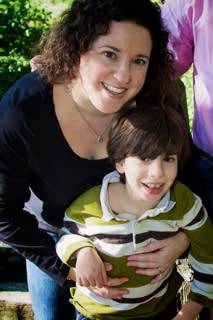What should we call a child with special needs?

By Ellen Seidman, To the Max
I think that there's an image problem with special needs. OK, I'm not talking an Anthony Weiner sort of problem. I'm talking about the words.
"Special needs" just doesn't sound cool, although out of all the terms, I tend to use it a lot because it's the most recognized term. "Differently-abled" is cooler but harder to explain and I don't always want to explain. "Disabled" emphasizes negativity, and "handicapped" just seems outdated to me.
I know, I know: Why are labels necessary? Sometimes, they just are. I don't always want to say "Max has cerebral palsy"-vague terminology comes in handy for forms, special accommodations at places, nosy people.
I've had many lively discussions with other parents, and all of us seem to agree there should be a better term. I recently met a mom who describes her child as "freaky-perfect." That one didn't work for me, as I think "freak" has some bad associations. A lot of people in the autism community describe kids as having "quirks," which I think is awesome but that term doesn't fit Max, who has cerebral palsy. I mean, it's quirky that he wants spaghetti for breakfast, lunch and dinner, but his spastic muscles? Not so much.
I've been known to say Max has "special powers"-a lot of people liked that term when I threw it out there, but then I got some scathing criticism from an adult with disabilities who said, among many things, that it made it sound as if people with disabilities have the power to fly or shoot lightning bolts from their fingertips. I still thought it could work well for a child. Although it would be really cool if Max could shoot lightning bolts from his fingertips.
When I talk about Max to his little sis, I tend to say that Max is just like other kids but some things take him longer to do. Sabrina knows the term "special needs" and used to tell people "Max needs special needs," which really didn't work.
One wording tactic that I have no qualms about is "people first" language-that means you put the person in front of the disability. So instead of saying "a special needs child" you say "a child with special needs." And instead of saying "An autistic adult" you say "An adult with autism." I never knew about it till I had Max, but once I did, it seemed like a respectful thing to do.
If you have a kid with special needs or who's differently abled or who has special powers, etc., what terms do you use when you have to? If you are a parent of so-called typical kids, what words do you use to describe children you know who have special needs?
Ellen Seidman blogs at To the Max, on Parents.com, and at Love That Max.
See more Parents.com mom blogs or ask a question for our panel of parenting experts.
